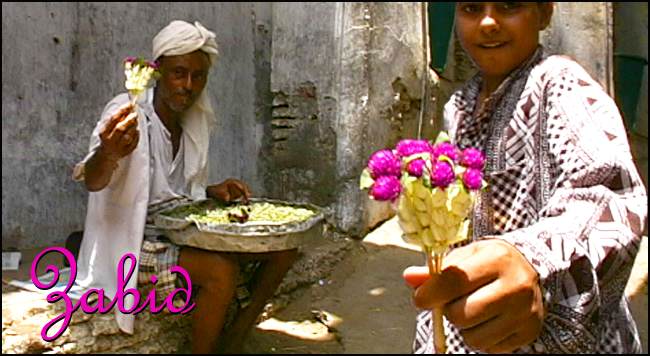|
Zabid was a laid back town with many shai stops and wide, partially paved streets. We saw other tourists exploring the ruins, conveniently located in the center of town, but most people had found shade from the mid-day sun.
|

 abid was founded in the Ninth Century and was the center of an influential Islamic school and the famed University of Zabid. Named after its first governor and founder, Zabid was one of the oldest towns in Yemen and one of the first to convert to Islam during the lifetime of Mohammed [PBUH]. It boasts several families whose lineage can be traced to the great prophet. abid was founded in the Ninth Century and was the center of an influential Islamic school and the famed University of Zabid. Named after its first governor and founder, Zabid was one of the oldest towns in Yemen and one of the first to convert to Islam during the lifetime of Mohammed [PBUH]. It boasts several families whose lineage can be traced to the great prophet. The international group, UNESCO, has declared Zabid as a World Heritage Site and has funded excavations of the old schools. Visitors can enter the ruins of the ancient university and inspect the intricate designs formed from the mud bricks. Several old buildings had evidence of Jewish influence, with the six pointed Star of David incorporated in the architectural scheme and decor. These sites are open to the public and are littered with pot shards and bricks. Most of the excavations are done in the cooler months. We could easily have spent an entire day taking photographs and exploring the ruins, but the sun was much too hot. The temperature in Zabid was cooler than Aden, but still quite hot. Gary had to scurry for any relief he could find. This was, after all, the summer and Yemen's lower regions are best visited in the fall or winter. When Gary disappeared we would often find him hiding in some shady corner [above left]. This was once a walled city. The remaining gates to the citadel are still intact and serve as a main entrance to the maze of narrow streets in the city interior. Sheep and goats roam the dusty streets while young children play in brightly colored dresses or small sport coats. Yemeni children are almost always dressed in this attire. Outside the walls of the city there is abundant agriculture. Archaeological evidence suggests that farming has been ongoing for many millennia. Zabid borders the coffee region of Yemen and a major part of the suq still trades in this crop. Aside from the suq, life is slow. Most of the town was low key and was a pleasant place to stop, have some coffee and relax in the Zabid Tourist Rest House. We slept out in the open and were very comfortable. The staff made a great breakfast with fresh eggs and bread and, of course, delicious tea and coffee. There was a good shower there and so we refreshed ourselves before continuing our trek. There are many mosques in Zabid. In fact, I was told that there was one mosque for every eight houses in the city. This one-time center of Islamic education is still the home to over 80 Koran schools and centers for Islamic studies.
|

Al Khokha
After a short ride from Zabid, we reached the Red Sea and the small fishing village of Al Khokha. We stayed in a small bungalow right on the shore at the picturesque Marine Village Resort. We watched the fishermen tend to their boats and nets while we rested from the road.
The wooden boats [above center] were all brightly painted with virtually every inch covered by some design. The colors of the boats blended beautifully with the palette of the shore.
Sky took a walk along the beach accompanied by two kelba, the dogs, of the hotel. There were other wild dogs on the beach and these two friends flanked her and barked when they approached.
A woman harvested palm leaves on the beach [above left] while boys threw nets for shrimp along the shore. Looking to the Eastern horizon, it was amazing to think that Africa was just across the water!
The diwan, the qat house of the resort, was full of music that night. Our crew joined a posse of ocean divers for tea and entertainment. The area is excellent for underwater scuba and snorkel diving. The evening air was warm and balmy. We slept well and were ready for our next adventure in Yemen.
|
